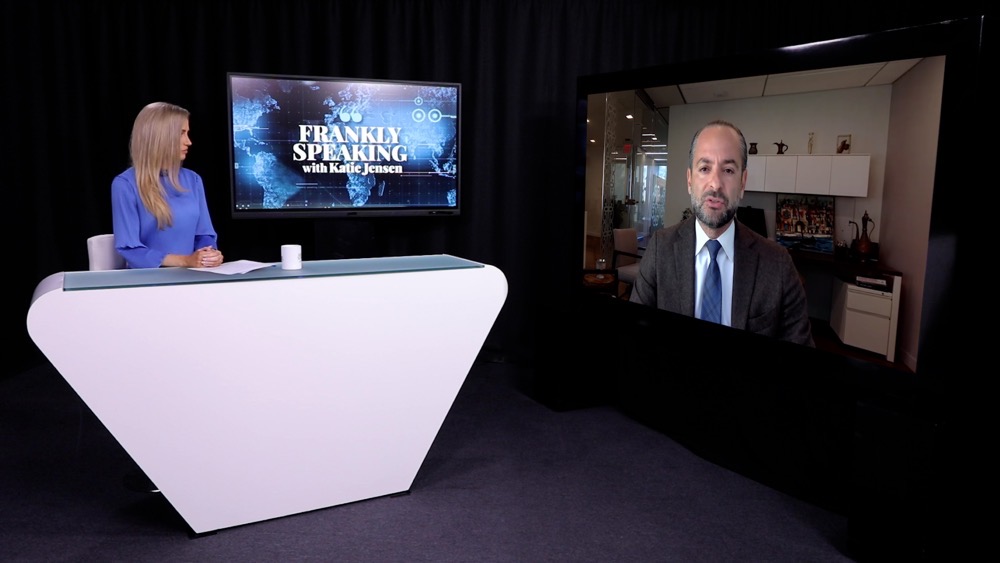DUBAI: As the US presidential election looms, a YouGov poll commissioned by Arab News has revealed a near-even split between former president Donald Trump and Vice President Kamala Harris among Arab American voters. This result may surprise some, but according to a prominent Arab American analyst of Middle East affairs, it reflects the general sentiment among the US public, where key constituencies in swing states will determine the next occupant of the White House.
“Clearly, we see that the Arab American public generally reflects the same trend here as the American public because so many of these Arab Americans are not newly naturalized,” Firas Maksad, a senior fellow at the Washington-based Middle East Institute, said on the Arab News weekly current affairs show “Frankly Speaking.”
The YouGov survey results suggest that the Israeli war in Gaza and other events in the Middle East weigh strongly on the mind of the average Arab American voter. “But at the end of the day, it’s American Arab rather than Arab American,” Maksad said. “They have to vote based on bread-and-butter issues, the well-being of their families, the issues that impact them at home, rather than have an impact overseas. That’s not surprising.
“They are second, third, fourth-generation Arab Americans. Some of them came here in the mid-1800s. And so, they very much reflect the general sentiment in the American population.”
He added: “When asked point-blank about the significance of Gaza, most Arab Americans rank it as the top issue. However, that doesn’t seem to reflect in their overall choice. You would expect that not so many of them would be voting for President Trump, who was so clearly pro-Israel, who moved the American Embassy to Jerusalem and allowed Israel to annex the occupied Golan Heights,” Maksad said.
“There might be some tension between what Arab Americans say when asked what they think about Palestine, and the fact that they are also Americans who have their livelihood to worry about, the economy being chief among them, but also things like immigration. For so many women, also issues relating to their reproductive rights and abortion.”
Historically, the Arab vote has had little impact on the results of US elections. But is that still the case or has something changed? “That’s not the case,” Maksad said, “because of where they (Arab American voters) are, where that constituency is. States like Michigan that are going to be crucial, but even in Georgia, a significant population. Close to where I am in Washington, D.C. is Virginia, and there is a significant Arab population there in northern Virginia,” he said.
Read our full coverage here: US Elections 2024: What Arab Americans want
Indeed, elections that hinge on narrow margins make smaller constituencies like Arab Americans vital to either party’s success. Their impact in key states is magnified when considering the razor-thin victories in recent elections. The race in many states is so tight that “the margin is 0.5 percent one way or the other,” Maksad told Katie Jensen, host of “Frankly Speaking.”
He added: “So, that makes the Arab American vote a crucial one, a crucial constituency to win. We see that reflected in the positions of the various campaigns and the efforts to cater to, and to win over, that segment of the population.”

Firas Maksad unpacked the YouGov survey findings with ‘Frankly Speaking’ host Katie Jensen. (AN photo)
Maksad added that the “willingness and excitement” of Arab Americans to vote, “far exceeding” that of the general population, is a “sign of health that the Arab American community is engaged in the democratic process here in the US, particularly when there are concerns about discrimination and racism.”
Some 40 percent of Arab Americans who were surveyed by YouGov considered themselves Democrats while 28 percent were Republicans. Yet a slim majority was going to vote for Trump.
“The question has been out there as to whether some of this is a protest vote against the Biden-Harris ticket or team for their inability or lack of a political will to rein in Israeli Prime Minister Benjamin Netanyahu,” Maksad said.
“But, again, what’s sort of puzzling about this is that if this is a protest vote, you wouldn’t necessarily vote for Trump because he is even more pro-Israeli for all the reasons that we’ve already discussed. You would go through a third party candidate like the Greens. So, I don’t know how much of that can be prescribed to what has unfolded in the Middle East.”
Maksad said that factors such as immigration and the economy need to be taken into account, too. “Immigration seemed to very interestingly rank very high on the minds of Arab Americans, which honestly, as an immigrant myself, I was not completely surprised by because those who immigrated here legally and went through the process, and paid the taxes, tend to feel pretty strongly about those who are cutting in line and not paying their fair share,” he said.
“So, illegal immigration here, which often plays in favor of Trump rather than Harris, could also be a factor.”
Looking ahead, Maksad said that a snapshot look at the latest US opinion polls suggested that the Trump campaign is gaining momentum. So, what would a Trump win mean for the Middle East?
“The sense, whether rightfully or wrongfully, is that President Trump is a much more forceful figure, particularly when it comes to the Middle East. Everybody here recalls the Abraham Accords (between Israel and several Arab countries), which many did not think were possible,” he said.
“There’s that sense then, this promise that President Trump has kept repeating that he will end those wars, whether it’s the war in Ukraine or the war in Gaza. We will have to see whether he will make good on that promise.
“Whether he will be able to bring Netanyahu to heel on issues that the US wants to … is an open question.”

























